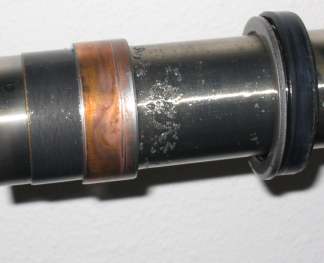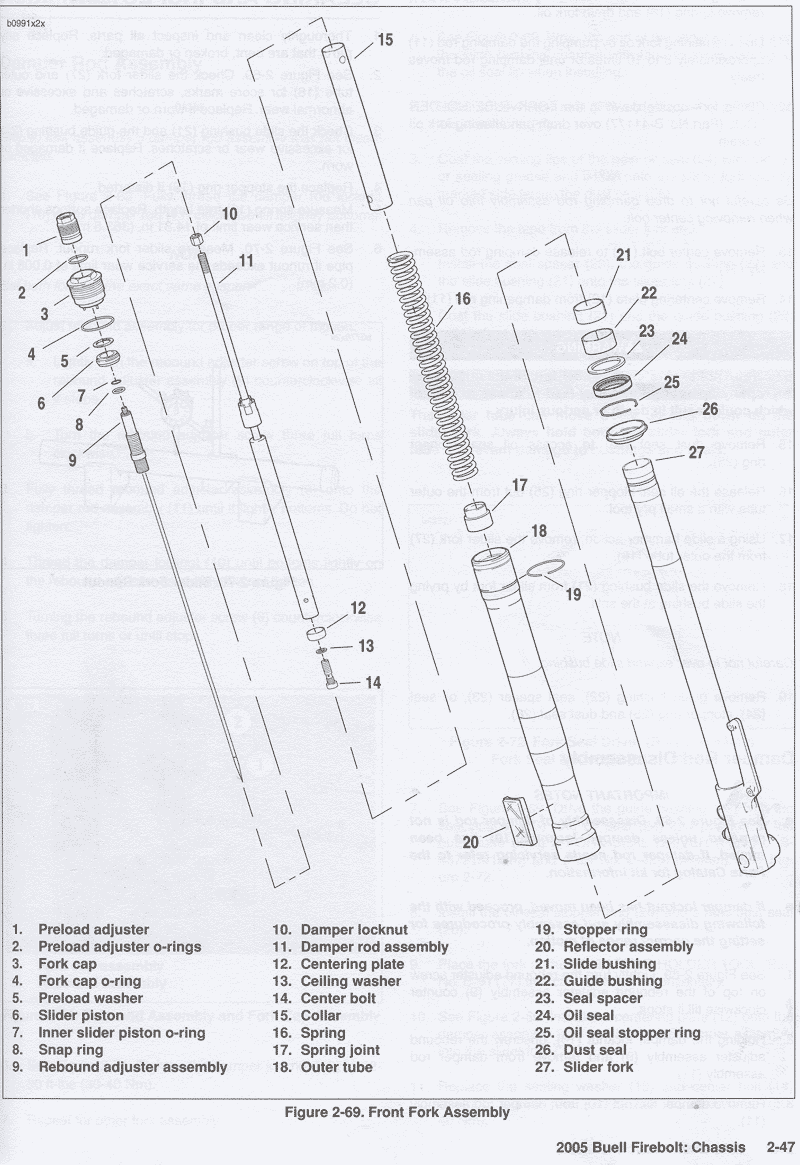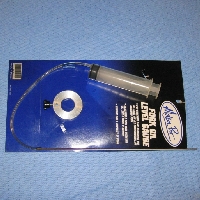| Author | Message | ||
Kowpow225 |
Well I finally put it off long enough and dove into it. A couple of questions for those who have messed with their forks. First, did anyone mess with either the compression or rebound adjustment screws on just an oil change? The manual mentions this but was a little unclear when it came back to reassembly time. Also, is there a trick to holding the damper rod up to get the threads started on the rebound assembly/fork cap when reassembling? I actually ended up using a magnetic 'grabber' to hold it up while compressing the spring but there must be an easier way. And finally, can the stock springs be put in upside down? I mean is there a top or bottom? A bit of wisdom for others who may run across this thread. The fork cap on my bike was absurdly overtightened from the factory. Buy yourself a 1-1/4" deep well socket so you don't 'egg' the cap as I did. Buy the one man spring compressor if you have the money. The traction dynamics kit is great but absolutely needs another person to slide the shim in place. | ||
Pwnzor |
I rebuilt mine after I noticed oil leaking from one side, and they felt a little squishy. I don't think there is such a thing as top or bottom on a spring, but I could be wrong about that. Mine went back in without regard to orientation. Because of the oil leak, I had assumed that my seals were bad, so I attacked it with that in mind, BUT, when I got in there, this is what I discovered:  The teflon coating on the bushings had been worn off.  On further examination, I found my seals to be just fine. What happened was that the teflon "shavings" had gotten between the fork leg and the seal, causing a little gap which the oil was leaking through. After cleaning everything up and reassembling with help from Al at American Sport Bike , my results were a very inexpensive rebuild and like-new performance from my forks, which has lasted to this day, some 18 months and 10,000 miles later. My fork cap was crazy tight also, but I believe it was over-torqued by the dealership where I bought it, because they did the 10k service which supposedly included fork service. Incidentally, that 10k service was the last time I ever let a dealer touch my bike, and I'm over 40k miles now. In the last 30k miles I have spent less than half what I spent on maintenance in that first 10k. Dealerships are called stealerships with very good reason. | ||
Jos51700 |
There is a proper orientation on the springs, but my books are packed away so I can't look it up. I'm sure there's a reason for which end is up, but I don't know it. It is wise to the back the rebound screw completely out. When you thread the fork cap back onto the damper rod, there is a spec (Found only in the later manuals) for the number of threads from completely-seated it needs to be before you tighten down the lock nut. If the rebound screw is in too far, threading the cap on too far can force the rebound needle down into it's seat, damaging it. I apologize for not having more specific info, but like I said, my books are all packed up. Yes there is a tool for withdrawing the damper rod, and it makes bleeding the cartridge alot easier, but it can be done without it. The tool is just an aluminum rod with a nut on it that threads onto the damper rod. Also, if you do the complete disassembly as pwnzor's photos show, sometimes the slide-hammering can strip a little teflon off the bushings as they are driven out. This is normal and not indicative of a problem. This is obviously NOT the case with pwnzor's forks, and I do not know what would cause that. | ||
Pwnzor |
There is a proper orientation on the springs I don't know, maybe on some progressive springs, but the stock springs are the same on both ends, there is no reason for them to be inserted in any particular direction.  Springs like these, I could understand why they would need to be oriented one way or the other.  | ||
Jos51700 |
Personally, I've never understood why one end would go in before the other on progressive springs, except to possibly affect oil level. I think the rule of thumb is to have the tighter-wound coils down, but I don't know why....(and I may be wrong on that) I know the parts book show a non-progressive spring, but it's a parts book, not engineering blueprints or assembly instructions. The parts book also shows the bottom bolt going inside the lower leg. The service manual I have does specify a direction. I'll have to try and dig it out because now I'm curious. I would love to find out why it matters.....} | ||
Dbird29 |
look in the Knowledge Vault. http://www.badweatherbikers.com/buell/messages/384 2/249047.html?1188735029 lots of pics. | ||
Pwnzor |
Personally, I've never understood why one end would go in before the other on progressive springs, except to possibly affect oil level. I think the rule of thumb is to have the tighter-wound coils down, but I don't know why.... Oil level is affected by progressive springs. Tighter coils at the bottom provides a lower center of gravity. There is no up or down on stock springs. Are you using a non-factory service manual? | ||
Kowpow225 |
I figured the SM would specify top or bottom on reassembly time wrt the springs... Do you know where I could find that threaded tool Matt? | ||
Pwnzor |
Call Al at American Sport Bike he's got everything you need to do the forks right. | ||
Bombardier |
More coils at the bottom also means you will have less than the recommended amount of fork oil as the spring coils will displace the oil. | ||
Pwnzor |
The actual amount doesn't matter as long as it comes to the correct level, and you have the same amount on both sides. | ||
M1combat |
I think progressive springs should be mounted with the progressive portion to the top. | ||
Kowpow225 |
More density toward the top? Is that what you mean? That's the way most progressive car springs are situated. I wonder if that may be inverted on the forks our buells have. Under the car logic, the weaker part of the spring compresses first. | ||
Jos51700 |
The only problem with progressive springs (if that even applies here) is that if the oil level is specified without the spring in place (and I don't remember if it is or isn't), is that going in with the wrong end first will make the oil level incorrect. | ||
Pwnzor |
Thats why you add the oil after the springs go in. And use one of these:  American Sport Bike has them. | ||
S_palmer |
Uly manual says measure oil level with fork compressed, damper rod bottomed,without springs. | ||
Gentleman_jon |
While you have the forks apart, you might want to give some consideration to upgrading to the competition springs. They are not very expensive, and are avail from many of our sponsors. They are a bit stiffer, and not progressive. They improve handling if you like to ride in a spirited manner, and are especially useful if you are above normal weight, (160 lb.s). Not to mention the fact that it doesn't matter which end goes in first.  | ||
Jos51700 |
I know some of the books change things around, but I'm pretty sure the springs go in AFTER the oil level is set, as Palmer states. I know the S1 book does it like that (Given, that's a different fork). Play it safe, look it up in the PROPER book for your bike. It will state, in no uncertain terms, the proper order, and it will probably say if the orientation of the spring matters or not. What is the exact year/model? | ||
Kowpow225 |
2003 xb9s .... From my skimming skills the book says nothing about which is up or down. | ||
Xl1200r |
Wait a sec - you have to disassemble the forks to change the fluid!?!? This sounds like a bigger job than I wanted it to be... | ||
Gowindward |
In a normal fork oil change the service manual '04 Firebolt does not call for removal of the spring. You take spring load off the damper rod assy, but never remove the spring from the fork tube. Drain oil, pump damper rod to remove oil from it, then refill pump damper road and then measure level. | ||
Pwnzor |
+1 on that. I had to take my forks apart to find out why they (only one side actually) were leaking. Once I got in there, I found the bushings were liberated of their Teflon coating. Replaced 'em, forks are good as new to this day. Fluid change can be done while they're on the bike. | ||
Kowpow225 |
You take spring load off the damper rod assy, but never remove the spring from the fork tube. Yeah but the spring just kind of floats around in there once spring tension is removed and when you turn it upside down to drain the oil, well gravity kind of removes it for you. Sounds like each years SM may be a little different in this area. | ||
Xl1200r |
Fluid change can be done while they're on the bike. I was gonna say, doing it on my HD was cake. I didn't know if the USD forks were different. Thanks for the clarification. | ||
Gowindward |
I think the teflon coating gets trashed during the process of driving the seal out. | ||
Gowindward |
How can the fluid be change while the forks are still on the bike? | ||
Pwnzor |
Pump the oil out with a siphon, or other similar apparatus. | ||
Grahamnz |
Most modern bike forks need to be removed and the springs removed for an oil change. At the same time it's best to flush the forks first with kerosene and then with some fork oil, then drain thoroughly and fill to the specified level with the springs out and the fork legs compressed. The days of drain plugs are long gone, sadly. Worse still is that Buell forks (Showa actually) need a spring compressor for disassembly. | ||
Beebbop |
quick question...whats the downside of NOT servicing the front forks if theres no leaks or problems? (ive got an 05 xb9s with 23k miles) | ||
Pwnzor |
I can't see the downside, other than the fact that oil viscosity breaks down over time. And I used brake parts cleaner on mine, worked great. The job seems daunting, but with the right tools it's really not bad. After Al helped me last time, I feel could do it on my own now. My best advice is just don't rush it. |